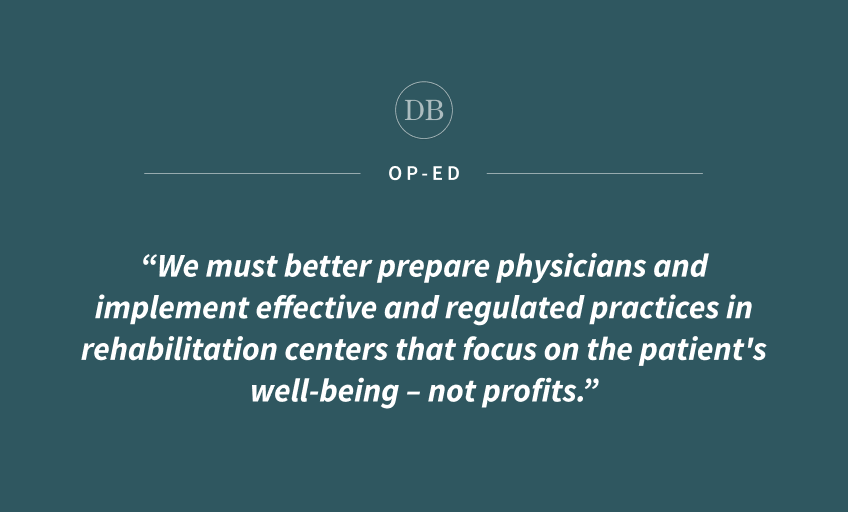Op-ed: Reforming substance use curriculum in medical training can aid addiction treatment

By Mareen Kassabian
Nov. 4, 2021 2:00 p.m.
This post was updated Nov. 7 at 10:50 p.m.
I’ve been preparing for medical school, which, as any other pre-med knows, is quite a lot of preparation. Through all of my shadowing, MCAT practice and volunteering, I’ve yet to see anything covering treating patients with addiction. There is an apparent gap in the curriculum for medical students and a lack of holistic preparation for practicing physicians. The first step in combating this disparate system is to improve addiction education.
In the United States, substance use disorders are treated like moral failings rather than an epidemic. Our government and judicial systems perpetuate this stigmatization, as one in every five individuals incarcerated is charged with drug-related crimes, and 450,000 of those individuals have nonviolent charges. The nation’s health care system is also ill-equipped to handle addiction – an issue that affects more than 23 million Americans, according to the National Institutes of Health. Combating this issue requires the rewiring of multiple infrastructures, but reforming our flawed health infrastructure should take priority.
The stigma surrounding substance use disorders is ubiquitous. Talks about addiction usually elicit an adverse reaction in which individuals immediately judge and discount an addicted person’s experiences. These negative attitudes and opinions then lead to negative stereotypes, which can alter an individual’s self-concept. This leads to a phenomenon called “self-stigmatization,” in which individuals dealing with addiction must overcome feelings of guilt and shame because of how the public perceives them. Self-stigmatization can be even more damaging by encouraging individuals to continue using dangerous substances.
Harm reduction programs aimed at both children and adults alike can rewrite the majority opinion. Venture programs such as the Substance Use Risk Profile Scale and adult education programs affiliated with the American Academy of Addiction Psychiatry such as Recognizing and Eliminating disparities in Addiction through Culturally informed Healthcare will raise awareness and improve the public’s understanding of what it means to have an addiction. Education on this topic will help reduce stigma and allow individuals to start seeing people with addiction as people. Harm reduction programs such as heroin-assisted therapies and needle and syringe programs allow users a safe space to use responsibly with medical-grade heroin and clean syringes to ensure that all the supplies are safe to use.
While reformation of our health care system and direct implementation of harm reduction programs won’t solve everything, they will allow professionals to better treat individuals dealing with addiction and the emotional consequences of substance use.
One step we can take to reform the health care system and increase general knowledge on how to treat individuals dealing with addiction is implementing the biology of addiction within the medical school curriculum. In research studies, results have shown that students in medical school who have received addiction education along with the traditional curriculum were better equipped when faced with a patient struggling with addiction. We need unbiased, prepared physicians in our health care system to ensure that positive change will come. Such a curriculum will not only prepare our future physicians but will also help make strides toward eliminating the stigma around addiction as more individuals begin to understand what it is.
Studying human biology and society, I’ve had some exposure to the neurobiology of addiction. However, as a student on the pre-med track, none of my prerequisite courses thus far have talked about the science of addiction. As a university in a state with about 8% of the population managing substance use disorders, UCLA needs to integrate the science and social applications of addiction into its curricula for students pursuing degrees and careers in health sciences. This will allow for Bruins pursuing careers in medicine, public health and health care to have a more robust and holistic preparation before entering graduate schools and the workforce.
People with addiction will also seek help through rehabilitation centers during their recovery. These centers have a staff full of underqualified, nonmedical professionals treating a highly sensitive disease and promising to provide a full recovery while implementing practices with no biological efficacy. Some of these exploitative practices include labor trafficking, in which patients are forced to do labor with no pay while the rehabs profit off their work, and attack therapy, in which patients take turns degrading one another. These practices are unethical and violate labor laws, but they are rarely investigated.
Additionally, the lack of regulations in these centers allows for unethical practices to continue. Anybody is only a phone call away from being admitted into rehab without any prior screening, and providers have little to no requirements, according to NPR. The government dollars funneled into these centers need to be allocated to educating physicians and giving them the resources they need to treat addiction.
While it’s easy for me to speak on the stigmatization and lack of viable and effective treatment options for people with addiction, a long, winding road lies ahead as we stand up and commit to reforming our health care system. We must better prepare physicians and implement effective and regulated practices in rehabilitation centers that focus on the patients’ well-being – not profits.
Kassabian is a fourth-year human biology and society student.


